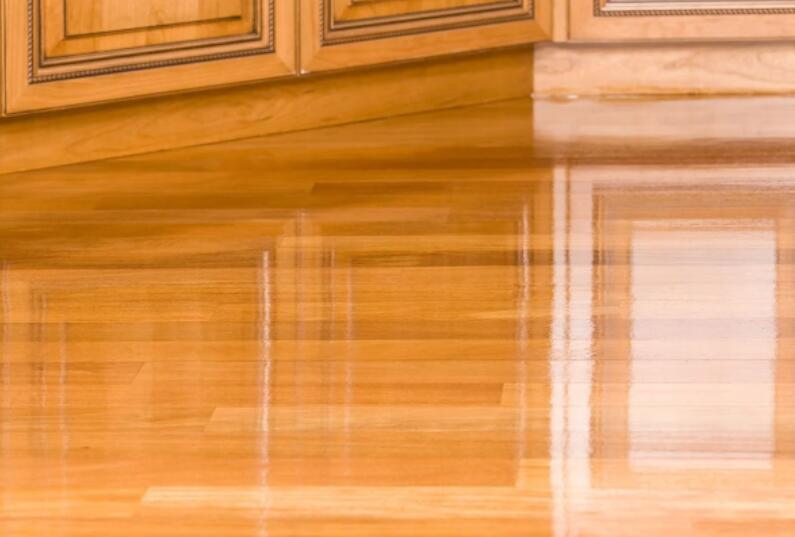Imagine this: you’re cleaning your home, feeling proud of your hard work. You reach for the bleach, ready to tackle a particularly stubborn stain on your wooden floor. But then a voice in your head whispers, “Wait, is that safe?” And you freeze, unsure what to do.

Image: viewfloor.co
This is a question many homeowners face. Bleach is a powerful cleaning agent, but it’s also harsh. Can it be used on wooden floors without causing damage? The answer, as you might suspect, is complex. It’s not a simple yes or no. It depends on several factors, including the type of wood, the finish, and the extent of the stain.
The Harsh Reality of Bleach on Wood
Bleach, a potent combination of chlorine and water, is designed to break down organic matter like bacteria, mold, and mildew. This makes it effective for disinfecting surfaces, but it also means it can attack organic materials like wood.
The problem with bleach on wooden floors stems from its powerful nature. It can:
- Strip Away Finish: The protective layer on your wood floor, whether it’s varnish, polyurethane, or wax, can be stripped away by bleach. The result? A dull, faded floor that’s more susceptible to scratches and water damage.
- Discolor Wood: Depending on the wood’s species and color, bleach can lighten or even completely change its hue. Imagine your beautiful cherrywood floor turning a pale, washed-out shade!
- Damage the Wood: Repeated bleach usage can weaken the wood fibers, making them brittle and prone to cracking.
When Bleach Might Be a Desperate Measure
Let’s be realistic. There are times when bleach might be the only solution for cleaning a wooden floor. For example, if you’re dealing with:
- Mold or Mildew Growth: These tenacious organisms thrive in dark, damp environments. Bleach can effectively kill them and prevent future growth, but it should be a last resort.
- Severe Stains: Deeply embedded stains, such as those from red wine or fruit juice, might require the stronger cleaning power of bleach. However, proceed with caution!
Safe Alternatives: Embrace Gentle Cleaning Power
Before you reach for the bleach, consider gentler, less harsh cleaning options for your wooden floors:
- Soap and Water: A simple mixture of mild dish soap and warm water can often tackle most dirt and grime.
- Wood Cleaners: Specialty cleaners specifically formulated for wooden floors are readily available. Look for cleaners that are pH-neutral and won’t harm the finish.
- Baking Soda: A natural abrasive, baking soda can help remove stubborn stains. Mix it with water to create a paste and apply it to the stain.
- White Vinegar: This acidic solution can be used to remove mild stains and disinfect surfaces.

Image: mopreviewer.com
Tips for Minimizing Risk When Bleach is Necessary
If you absolutely must use bleach on your wooden floors, follow these safety tips:
- Test in an Inconspicuous Spot: Always test the bleach in a hidden area of your floor to ensure it doesn’t damage the finish or alter the color.
- Dilute Bleach Heavily: Never use undiluted bleach on wood floors. Mix one part bleach with 10 parts water.
- Apply Carefully: Don’t soak the wood in bleach. Apply it with a damp cloth and wipe away any excess immediately.
- Rinse Thoroughly: After cleaning, rinse the area with clean water to remove any bleach residue.
- Dry Completely: Allow the floor to dry completely before applying any polish or sealant.
What Experts Have to Say
“Unless you’re dealing with a serious mold infestation, bleach is often overkill for wooden floors,” says [Name of Wood Floor Expert], a flooring specialist with decades of experience. “[Expert’s quote about the importance of a good quality finish for protecting the floor], and bleach can easily strip that protection.”
Can I Use Bleach On Wooden Floors
The Bottom Line: Choose Wisely
Ultimately, the decision of whether or not to use bleach on your wooden floors is yours. However, it’s important to weigh the risks and benefits carefully. For most homeowners, gentle cleaning methods are sufficient and far safer for preserving the beauty and integrity of their floors.
If you’re unsure, it’s best to consult with a professional flooring expert or a trusted cleaning service. They can provide personalized advice based on your specific flooring type and needs.
So, while bleach might seem like a quick fix, remember that when it comes to your precious wooden floors, a gentle touch is often the best approach. Don’t let a quick clean become a costly mistake!






